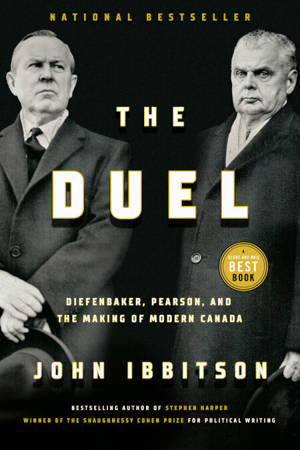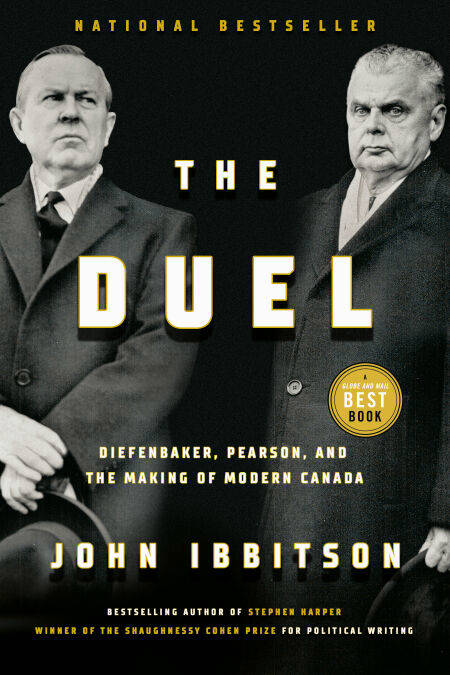
- Retrait gratuit dans votre magasin Club
- 7.000.000 titres dans notre catalogue
- Payer en toute sécurité
- Toujours un magasin près de chez vous
- Retrait gratuit dans votre magasin Club
- 7.000.0000 titres dans notre catalogue
- Payer en toute sécurité
- Toujours un magasin près de chez vous
20,70 €
+ 20 points
Format
Description
INSTANT NATIONAL BESTSELLER
One of Canada’s foremost authors and journalists, offers a gripping account of the contest between John Diefenbaker and Lester Pearson, two prime ministers who fought each other relentlessly, but who between them created today’s Canada.
John Diefenbaker has been unfairly treated by history. Although he wrestled with personal demons, his governments launched major reforms in public health care, law reform and immigration. On his watch, First Nations on reserve obtained the right to vote and the federal government began to open up the North. He established Canada as a leader in the struggle against apartheid in South Africa, and took the first steps in making Canada a leader in the fight against nuclear proliferation. And Diefenbaker’s Bill of Rights laid the groundwork for the Charter of Rights and Freedoms. He set in motion many of the achievements credited to his successor, Lester B. Pearson.
Pearson, in turn, gave coherence to Diefenbaker’s piecemeal reforms. He also pushed Parliament to adopt a new, and now much-loved, Canadian flag against Diefenbaker’s fierce opposition. Pearson understood that if Canada were to be taken seriously as a nation, it must develop a stronger sense of self.
Pearson was superbly prepared for the role of prime minister: decades of experience at External Affairs, respected by leaders from Washington to Delhi to Beijing, the only Canadian to win the Nobel Prize for Peace. Diefenbaker was the better politician, though. If Pearson walked with ease in the halls of power, Diefenbaker connected with the farmers and small-town merchants and others left outside the inner circles. Diefenbaker was one of the great orators of Canadian political life; Pearson spoke with a slight lisp.
Diefenbaker was the first to get his name in the papers, as a crusading attorney: Diefenbaker for the Defence, champion of the little man. But he struggled as a politician, losing five elections before making it into the House of Commons, and becoming as estranged from the party elites as he was from the Liberals, until his ascension to the Progressive Conservative leadership in 1956 through a freakish political accident.
As a young university professor, Pearson caught the attention of the powerful men who were shaping Canada’s first true department of foreign affairs, rising to prominence as the helpful fixer, the man both sides trusted, the embodiment of a new country that had earned its place through war in the counsels of the great powers: ambassador, undersecretary, minister, peacemaker. Everyone knew he was destined to be prime minister. But in 1957, destiny took a detour.
Then they faced each other, Diefenbaker v Pearson, across the House of Commons, leaders of their parties, each determined to wrest and hold power, in a decade-long contest that would shake and shape the country.
Here is a tale of two men, children of Victoria, who led Canada into the atomic age: each the product of his past, each more like the other than either would ever admit, fighting each other relentlessly while together forging the Canada we live in today. To understand our times, we must first understand theirs.
One of Canada’s foremost authors and journalists, offers a gripping account of the contest between John Diefenbaker and Lester Pearson, two prime ministers who fought each other relentlessly, but who between them created today’s Canada.
John Diefenbaker has been unfairly treated by history. Although he wrestled with personal demons, his governments launched major reforms in public health care, law reform and immigration. On his watch, First Nations on reserve obtained the right to vote and the federal government began to open up the North. He established Canada as a leader in the struggle against apartheid in South Africa, and took the first steps in making Canada a leader in the fight against nuclear proliferation. And Diefenbaker’s Bill of Rights laid the groundwork for the Charter of Rights and Freedoms. He set in motion many of the achievements credited to his successor, Lester B. Pearson.
Pearson, in turn, gave coherence to Diefenbaker’s piecemeal reforms. He also pushed Parliament to adopt a new, and now much-loved, Canadian flag against Diefenbaker’s fierce opposition. Pearson understood that if Canada were to be taken seriously as a nation, it must develop a stronger sense of self.
Pearson was superbly prepared for the role of prime minister: decades of experience at External Affairs, respected by leaders from Washington to Delhi to Beijing, the only Canadian to win the Nobel Prize for Peace. Diefenbaker was the better politician, though. If Pearson walked with ease in the halls of power, Diefenbaker connected with the farmers and small-town merchants and others left outside the inner circles. Diefenbaker was one of the great orators of Canadian political life; Pearson spoke with a slight lisp.
Diefenbaker was the first to get his name in the papers, as a crusading attorney: Diefenbaker for the Defence, champion of the little man. But he struggled as a politician, losing five elections before making it into the House of Commons, and becoming as estranged from the party elites as he was from the Liberals, until his ascension to the Progressive Conservative leadership in 1956 through a freakish political accident.
As a young university professor, Pearson caught the attention of the powerful men who were shaping Canada’s first true department of foreign affairs, rising to prominence as the helpful fixer, the man both sides trusted, the embodiment of a new country that had earned its place through war in the counsels of the great powers: ambassador, undersecretary, minister, peacemaker. Everyone knew he was destined to be prime minister. But in 1957, destiny took a detour.
Then they faced each other, Diefenbaker v Pearson, across the House of Commons, leaders of their parties, each determined to wrest and hold power, in a decade-long contest that would shake and shape the country.
Here is a tale of two men, children of Victoria, who led Canada into the atomic age: each the product of his past, each more like the other than either would ever admit, fighting each other relentlessly while together forging the Canada we live in today. To understand our times, we must first understand theirs.
Spécifications
Parties prenantes
- Auteur(s) :
- Editeur:
Contenu
- Nombre de pages :
- 456
- Langue:
- Anglais
Caractéristiques
- EAN:
- 9780771003271
- Date de parution :
- 09-10-23
- Format:
- Ebook
- Protection digitale:
- Adobe DRM
- Format numérique:
- ePub

Les avis
Nous publions uniquement les avis qui respectent les conditions requises. Consultez nos conditions pour les avis.






